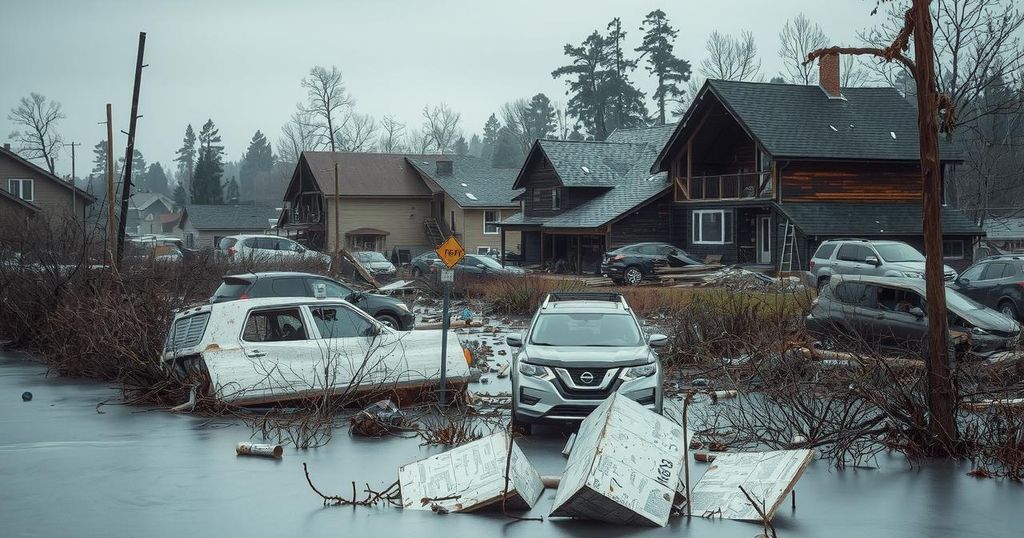Residents in Niger Battle Stench from Decaying Corpses After Flooding Disaster
Residents of Mokwa in Niger State are facing grave health concerns due to the lingering stench of decaying corpses, following devastating floods that killed approximately 200 individuals. The government has pledged funds for recovery, but community members express urgent needs for action and assistance.
In the wake of catastrophic flooding that engulfed Mokwa Local Government Area in Niger State, residents are now grappling with the unbearable smell of decaying corpses believed to be flood victims. Nearly two weeks have passed since the disaster, yet the odor remains a grim reminder of the tragedy, raising serious health concerns among the community. The floods, triggered by heavy rainfall on May 28 and 29, resulted in the loss of approximately 200 lives and displaced thousands.
The Niger State Emergency Management Agency (NSEMA) reports significant devastation, with over 50 homes lost and more than 3,000 individuals displaced by the floodwaters. As rescue and recovery operations continued, the agency accounted for at least 161 bodies recovered from varying locations within the town, some hidden beneath sand and debris.
During a recent visit to Mokwa, residents like Esther Nwanosike expressed their alarm over the persistent stench, stating, “I sell food in a makeshift shop. The smell is overwhelming, and I am concerned about the potential health implications.” Customers frequenting her stall have voiced their discomfort, struggling to breathe as the odor fills the air. Nwanosike pleaded with authorities to fumigate the area to alleviate the intolerable smell.
Further underscoring the gravity of the situation, Alhassan Kolo detailed how the odors from the decaying remains have permeated the community. “Honestly, some of the bodies we recovered, you can’t even recognize them anymore because they are decaying,” he lamented. The ongoing cleanup has revealed both personal belongings and corpses buried underneath the sand.
Another affected resident, Ahmed Yusuf, articulated the widespread distress, remarking, “I believe the stench is from the corpses of those victims that had not been found.” His concerns reflect the shared anxiety over the number of missing individuals, as he urged the government to act swiftly for the community’s health.
Salihu Ishaq also shared stories of loss, noting that many displaced individuals are reluctant to stay in camps established by the government. He recounted his own devastating experience, losing family members to the flood, a tragedy he has never seen before in his lifetime.
In response, the Federal Government, represented by Vice President Kashim Shettima, has committed N2 billion to aid rehabilitation efforts in the affected region. Moreover, the Niger State government has also pledged N1 billion to support those impacted. Residents, such as Amina Abubakar, whose sister and her three children are among the presumed fatalities, have appealed for urgent aid. “The government should come in immediately, it is very urgent,” she insisted.
Idris Ibrahim, the Director of Public Health from the Ministry of Secondary and Tertiary Health, acknowledged the situation, assuring reporters that efforts are underway to manage the foul odor. Ibrahim indicated that a prevention control team was actively working on the issue and that the recovery of remains is ongoing. Efforts are being made to determine whether relocation of residents is necessary, a matter currently being discussed at the state level.
Meanwhile, the NSEMA has also provided updates on the recovery efforts. As of June 4, 2025, the official death toll stood at 161. Manzo Ezekiel, the Head of the Press Unit at the National Emergency Management Agency, added that ongoing efforts involve close coordination among federal and state governments, local authorities, and volunteers to provide relief and rehabilitation to the flood victims.
Zekiel noted that the unpleasant odor affecting the community stems not only from decomposing bodies but also from sanitation issues arising from the floods. “This is a residential area with many household toilets. When the floodwaters swept through homes, it exposed sanitation facilities,” he observed.
In a statement on Tuesday, Niger State Governor Mohammed Bago suggested that some floodwaters may have originated from neighboring countries, attributing part of the disaster to climate dynamics. He emphasized the need for a strategy to relocate populations from high-risk areas. During a condolence visit from the Borno State Governor Babagana Zulum, Bago acknowledged the support and called for a more robust approach to combat climate change. Zulum announced a donation of N300 million to support the flood victims, emphasizing solidarity and humanitarian concern across states.
In summary, the aftermath of the flooding in Mokwa has left residents devastated, plagued by the stench of decaying corpses and the uncertainty of missing loved ones. The government has made pledges of financial assistance for recovery and rehabilitation, but the community is in dire need of immediate aid and health interventions. As local officials undertake measures to address the health crisis and recovery efforts, the impact of both the flooding and the ongoing health concerns hang heavily over Mokwa.
Original Source: punchng.com




Post Comment